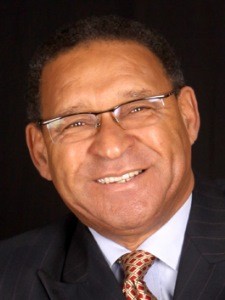Presbyterian News Service
The Rev. Allan Boesak — an influential anti-Apartheid activist and a principal author of the Belhar Confession — will be one of several church leaders, historians, and theologians scheduled to speak at a special event at Montreat Conference Center on Oct. 17.
Boesak currently serves as the Desmond Tutu chair of Peace, Global Justice, and Reconciliation Studies at Butler University and Christian Theological Seminary in Indianapolis.
Entitled “A Cry from the Heart for Unity, Reconciliation, and Justice: From Belhar to Ferguson,” the one-day conference will not only examine the roots of the Belhar Confession in South Africa’s apartheid era, but also explore struggles of race, class, and gender in the present U.S. context in both church and society.
“The Confession of Belhar speaks against the disunity, enmity, and injustice often hidden in our life as the church,” said the Rev. Charles Wiley, coordinator of the office of Theology and Worship. “The conversation around Belhar at Montreat will make plain some of these hidden areas in order to help us as a church to come to terms with our past and present, and thus to know better how to follow Christ faithfully in the future.”
The distinguished leadership platform also includes the Rev. Erskine Clarke, professor emeritus of American religious history at Columbia Theological Seminary, Decatur, Ga.; the Rev. Deborah Flemister Mullen, Columbia Seminary’s executive vice-president and dean of faculty as well as associate professor of American Christianity and Black church studies; and the Rev. Ron Peters, formerly associate professor of urban ministry and the first director of Pittsburgh Theological Seminary’s Metro-Urban Institute.
That Montreat will be hosting this significant event, is “right and a humble honor,” said the Rev. Pete Peery, president of the Montreat Conference Center.
“Montreat is a place where the church for decades intentionally practiced the sinful separation of people that hindered and broke the visible and active unity of the church,” said Peery, referencing the conference center’s history.
Yet Peery also cited Montreat's history of being the place where the 94th General Assembly (1954) of the [former] Presbyterian Church in the United States called thechurch to live into the integration of races by complying with the Brown v. Board of Education of Topeka, Kansas, Supreme Court ruling. He also noted that conferences in Montreat since the days of the civil rights movement have been "intentionally designed to nurture youth and adults to bear witness to Christ's work of reconciliation and to repudiate the separation of people on a racial basis."
“Montreat is a place where the church is still endeavoring to be opened to the reformation of its life by the power of God, to face and turn from its continuing racism, and to be a prophetic, transformative voice and agent toward unity, justice, and reconciliation,” he said.
The conference is also especially timely as presbyteries begin the process of voting on the actions of the 221st General Assembly (2014), including a proposed constitutional amendment that would add the Belhar Confession to the Presbyterian Church (U.S.A.)'s Book of Confessions .
As reported by the General Assembly News on June 18, before the confession can be added to the denomination's Constitution, it would have to be ratified by 115, or two-thirds, of the denomination's 171 presbyteries — each by a two-thirds vote — within the next year.
If the confession gains the approval of the presbyteries, the 221nd General Assembly (2016) would then be called upon to approve its inclusion in the Book of Confessions. If approved, Belhar would join the 11 Eurocentric creeds and confessions currently contained in the Book of Confessions and would be its first addition in nearly 30 years.
“We believe deeply that [the Confession of] Belhar is a word from God to our church at this time,” said the Rev. Clifton Kirkpatrick, a former General Assembly stated clerk and renowned global ecumenical leader. Kirkpatrick served as co-chair of the General Assembly’s Special Committee on the Confession of Belhar, which was appointed by the 220th General Assembly (2012).
“In the aftermath of the events in Ferguson, Missouri,” he added, “we are all challenged to make a strong witness against racism and for unity, justice, and reconciliation, and the Belhar Confession is a wonderful resource for doing just that.”
Because the committee was charged with educating the whole church about the confession, the one-day event is appropriate for all Presbyterians and interested others.
“"Anyone who studies Belhar will profit from the engagement,” said Wiley. “It’s an extraordinary document written by an extraordinary people in an extraordinary time. You can’t study it and not be awed by what they did.”
Join the conference virtually via live web stream.
Emily Enders Odom ― Communications Strategist for Theology, Worship and Education ― will be writing and editing for Presbyterian News Service from late-August until mid-November while PNS associate editor Bethany Furkin Daily is on maternity leave.

